Validation of mesoscopic theory and its application to computing concentration dependent diffusivities
Publication Date
2001
Journal or Book Title
JOURNAL OF CHEMICAL PHYSICS
Abstract
Despite numerous molecular simulation studies on the diffusion of small molecules through nanoporous films and on surfaces, most simulations have been limited to equilibrium conditions and relatively short time and length scales. Currently, there is a lack of a suitable computational framework which links molecular scale information with diffusion over larger scales. Here we employ a recently derived mesoscopic theory, which is exact in the limit of an infinite range potential, to model diffusion by a hopping mechanism through nanoporous films or on surfaces. One- and two-dimensional lattice gradient continuous time Monte Carlo simulations are compared to solutions of mesoscopic models for various finite range potentials and microscopic diffusion dynamics. The latter are solved using finite difference and spectral methods. We have found that the mesoscopic models quantitatively describe diffusion even for relatively short-range potentials, enabling comparison of model predictions to experimental data. It is shown that the accuracy of mesoscopic theories for a finite range potential improves with increasing system dimensionality. We have found that parameterization of a concentration dependent diffusion coefficient depends on various parameters in a complex way and can be multiple-valued. The implications of these results for modeling diffusion through membranes are also discussed.
Pages
11278-11288
Volume
115
Issue
24
Recommended Citation
Lam, R; Basak, T; Vlachos, DG; and Katsoulakis, MA, "Validation of mesoscopic theory and its application to computing concentration dependent diffusivities" (2001). JOURNAL OF CHEMICAL PHYSICS. 467.
Retrieved from https://scholarworks.umass.edu/math_faculty_pubs/467

Comments
The published version is located at http://jcp.aip.org/resource/1/jcpsa6/v115/i24/p11278_s1